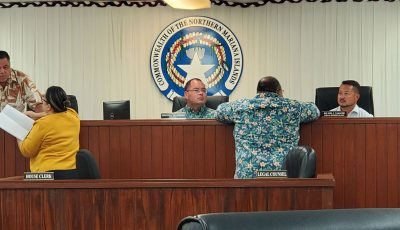House passes bill establishing Medicaid agency
Bill will also create clinical data warehouse; lawmakers work on legislation to get chunk of $60M federal funding
The House of the Representatives unanimously passed on Tuesday a bill that will establish the Commonwealth Medicaid Agency as a separate agency under the Office of the Governor and also creates a claims and clinical data warehouse.
All 19 House lawmakers passed Senate Bill 21-28 House Substitute 1 after lengthy discussions. Rep. Christina Sablan (Ind-Saipan) was excused as she is currently off-island. The bill now goes to the Senate.
In a later interview, House Committee on Health chair Rep. Jose Itibus (R-Saipan) said the original bill was introduced by Sen. Sixto K. Igisomar (R-Saipan) in the previous legislature, but he substituted everything in it to address the concerns raised in that bill.
Igisomar’s bill seeks to establish a claims and clinical data warehouse at the Commonwealth Health Care Corp. and to improve accountability for how health insurance premiums are spent by requiring health insurance insurers and health care providers to submit reports on claims and clinical data to the insurance commissioner.
Itibus said the concerns that were brought up by Rep. Sheila Babauta (Ind-Saipan) were really in regard to the original bill, which was the establishment of the clinical data warehouse that would be handled by CHCC.
Itibus said CHCC initially did not support the original bill because it required many things of CHCC and that concern has been addressed in the new bill.
He said he and members of the House Committee on Health and Welfare worked on this bill because the CNMI, with the help of Delegate Gregorio Kilili C. Sablan (Ind-MP) wants to tap a portion of $60 million in federal funding that is available.
“If we don’t have an established clinical data warehouse, we will lose a chunk of that money. But with implementation of a clinical data warehouse, which is under the Medicaid, we will get a lot of those $60 million,” Itibus said.
Itibus said they closely examined the bill and worked with three agencies so make sure that it will benefit the people of the CNMI.
Itibus said that he held on to the bill and, when he made it back to his second term as a representative, he re-introduced it, this time addressing many of the original bill’s concerns. He said he took those concerns from the previous comments and worked to address those issues in his new bill
“That’s how we came out with this new bill,” the lawmaker said.
He noted that there were some insurance representatives in the gallery during Tuesday’s session, but when he explained the bill to them and provided them a copy of the House’s version so they can look at it, they eventually supported it.
Itibus said the concern that was brought up at the session was really referring to the original Senate Bill 21-28. He said the bill that was discussed Tuesday was Senate Bill 21-28 House Substitute 1.
“This new substitute that we put in, we changed the whole content of S.B. 21-28 based on the concern from the insurers. We changed it to address their concerns,” he said.
Itibus said they substituted the bill based on working with Medicaid and CHCC.
Medicaid is a federal and state/territory program that helps with medical costs for some people with limited income and resources.
According to the House, the CNMI’s Medicaid program was originally established under the authority of the Department of Public Health and Environmental Services in 1978. With the passage of Public Law 16-51 in 2009, the Medicaid program was transferred to the Commonwealth Health Care Corp. In 2011, the Centers for Medicare and Medicaid Services directed the separation of the Medicaid program from CHCC to prevent conflicts of interest. In 2011, Executive Order 2011-16 was issued to transfer the Medicaid program to the Office of the Governor.
The House Committee on Health found that there is a need to establish the Commonwealth Medicaid Agency. The Legislature finds that the U.S. Congress may require the Commonwealth Medicaid program to submit data to the “Transformed Medicaid Statistical Information System” and establish a Medicaid Fraud Control Unit as a condition to increasing funding for the Medicaid program.
All U.S. states and the U.S. territories of Puerto Rico and the Virgin Islands have already implemented a “Medicaid Management Information System.
A Medicaid medical claims and clinical data warehouse is seen as a means to enable the monitoring and analysis of health care costs, among other things.



























